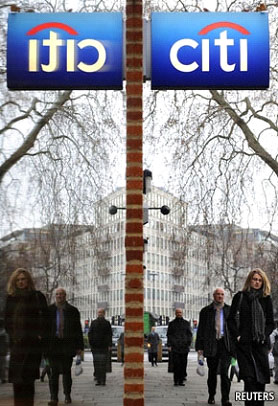A financial regulator under fire Unsettling Wall Street
金融監(jiān)管下的華爾街躁動不安
A judge rules against the SEC’s favorite way of penalizing financial institutions

AS AMERICA looks back on the financial crisis, the Securities and Exchange Commission (SEC), Wall Street’s main regulator, is under particular scrutiny. On November 28th a judge took aim at one of its pet habits: agreeing to “plea bargains” with financial institutions.
It works like this. A bank is accused of wrongdoing. It agrees to pay a huge fine to make the charges go away. Instead of going to court, the SEC agrees. The bank avoids admitting guilt, or being found guilty of anything. It also disarms aggrieved investors of a weapon (a conviction) which they might have used in future lawsuits.
From the public’s point of view, the advantage of such deals is that they are cheap and easy. A full trial against a big bank can cost a fortune. The bank, obviously, can mount a vigorous defense. By settling, the SEC guarantees a good-enough result. It collects money. The bank is shamed by the airing of (unproven) charges. The regulators can claim victory in press releases and self-congratulatory reports to Congress.
It is hard to imagine a more thorough rebuke of these arguments than that delivered by Jed Rakoff, a New York district judge, in rejecting a $285m settlement between Citigroup and the SEC.
The case involved a fund that, it is alleged, the bank had designed to fail. The subsequent implosion cost investors $700m while earning Citi $160m. Mr. Rakoff called the settlement not just a betrayal of the public interest, but the product of an approach “hallowed by history but not by reason” that provided the SEC with little beyond a “quick headline”. Settling without establishing the facts “is worse than mindless, it is inherently dangerous,” Mr. Rakoff wrote.
If the unproven allegations were correct, they constituted a violation of core principles of securities laws. Citi, said the SEC in its complaint, created a billion-dollar fund half-full of wretched mortgages. It then bet against it, earning fees on both ends of the transaction. Investors were not told of Citi’s role in choosing securities, nor how it stood to benefit if defaults ensued.
Those contentions alone would put Citi in violation of the disclosure provisions at the heart of the 1933 Securities Act, the foundation of market regulation. But in a curious twist, Mr. Rakoff noted that in a parallel complaint against the Citi employee who structured the fund, the SEC went a critical step further, suggesting deliberate deception and thus fraud, which would have put the bank at odds with another core provision of the act, and opened it up to civil litigation. The absence of the charge in the Citi complaint makes some wonder if the scope of charges is inversely proportional to the size of the defendant.
Beyond the issues in the immediate case, Mr. Rakoff noted that although the settlement called for Citi to operate under an injunction prohibiting further illegal conduct, such conditions had been imposed on it, and others, in the past, with no consequences. Merely establishing the authority of the court without firm cause, “serves no lawful or moral purpose and is simply an engine of oppression”, he wrote.
A settlement also carries other large costs for society, Mr. Rakoff added. “In any case like this that touches on the transparency of the public markets whose gyrations have so depressed our economy and debilitated our lives, there is an over-riding public interest in knowing the truth.” He ordered a retrial to begin in July 2012.
Unsurprisingly, Citigroup and the SEC both expressed their objections. Citi said it stood ready with “substantial factual and legal defenses”. The SEC noted decades of precedent, and asserted that the settlement “reflects the scope of relief that would be obtained after a successful trial”.
The SEC then released a letter from its chairman, Mary Schapiro, asking Congress for the right to inflict heavier penalties on recidivists, a barely veiled reference to Citi and its like. That may placate some of the SEC’s critics, but it does nothing to address Mr. Rakoff’s most important concern: that before a suitable punishment can be set, there must be a determination as to what occurred, and why it was wrong. Of such sentiments are revolutions born.
熱門推薦:
考研網(wǎng)校哪個好
新東方考研培訓(xùn)班
考研培訓(xùn)班
考研培訓(xùn)機構(gòu)哪個好
考研英語網(wǎng)絡(luò)課程
文都考研網(wǎng)校
北京考研培訓(xùn)班

